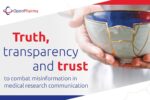This week, we spotlight the upcoming International Open Access Week 2025, which will focus on the theme of Who owns our knowledge? We signpost the latest Open Pharma guest post by Kora Korzec, which explains the importance of Crossref DOIs, and we learn that Frontiers has launched FAIR2 to tackle the issue of lost science. We also read about the COS 2026–2028 strategic planning cycle and explore MetaGraph, the new ‘Google for DNA’. Finally, we listen to a podcast from Pfizer UK exploring how to integrate patient partnership into RWD studies.
To engage with:
International Open Access Week 2025: who owns our knowledge? via International Open Access Week
International Open Access Week 2025 runs from 20 to 26 October, inviting global reflection on the theme Who owns our knowledge?. This year’s focus encourages communities to reclaim control over the knowledge they create and to reflect beyond accessibility, examining how knowledge is created, shared and valued, especially in the face of growing commercialization and disruption driven by artificial intelligence (AI). Get involved by registering for one or more of the community-led events taking place worldwide, joining the conversation using #OAWeek on social media, or sharing your commitment to open access (OA) by endorsing the Open Pharma position statement.
To read:
What you need to know about Crossref DOIs via Open Pharma | 6-minute read
Written by Kora Korzec (Director of Community at Crossref), this guest article for the Open Pharma blog demystifies the role of Crossref digital object identifiers (DOIs) and metadata in scholarly publishing. Crossref supports over 23 000 members globally by assigning DOIs to research outputs. These DOIs are not markers of quality but serve as stable, actionable links to scholarly content that enhance discoverability, transparency and long-term access. Kora also emphasizes Crossref’s commitment to open scholarly infrastructure, encouraging publication professionals to engage with its tools and community to improve research communication.
Frontiers launches FAIR² to rescue lost science via Frontiers | 6-minute read
“Ninety percent of science vanishes into the void,” explains Kamila Markram (Co-founder and CEO of Frontiers) as she announces the launch of FAIR² Data Management. This AI-powered platform is designed to tackle the staggering loss of scientific data by streamlining data curation, compliance and hosting, ensuring datasets are findable, accessible, interoperable and reusable (FAIR). Part of the platform is the FAIR2 Data Article – a new peer-reviewed publication format focused solely on single datasets rather than hypotheses. More information about how to get started can be found on the FAIR2 Data Management page.
COS sets strategic direction for open science transformation via COS | 9-minute read
The Center for Open Science (COS) is developing a strategy for 2026–2028 to advance openness and rigour in research. Their community-driven planning process focuses on inclusivity, evidence-based decision-making and actionable goals. Key priorities include refining COS’s role in the global ecosystem, improving metrics to track progress and promoting community ownership and stewardship of open science tools and frameworks like the Transparency and Openness Promotion (TOP) Guidelines and Registered Reports. The final strategy will be released in early 2026.
‘Google for DNA’ promises faster, smarter biological insights via Nature | 4-minute read
A new tool called MetaGraph, dubbed the ‘Google for DNA’, promises to revolutionize how scientists search vast biological data sets. By indexing databases of DNA, RNA and protein sequences, MetaGraph enables researchers to uncover hidden genetic patterns without prior annotation. This innovation addresses long-standing accessibility issues in repositories like the Sequence Read Archive, making raw sequencing data more usable. “It enables things that cannot be done in any other way,” says Rayan Chikhi (Researcher and Group Leader at Institut Pasteur).
To watch:
Patient partnership in RWD via PfizerUK | 27-minute watch
“How do we ensure patients are properly embedded in the [real-world data (RWD) research] process as opposed to secondary to the process”, asks Orlando Agrippa (Founder and CEO of Sanius Health and Patient Advocate for sickle cell disease) in this video podcast titled Patient involvement in designing Real World Data studies by Pfizer UK. Orlando is joined by Ellie Cannon (General Practitioner, Broadcaster and Author) and Oliver Shastri (Senior Medical Director, Sickle Cell Disease, US Medical Affairs at Pfizer) to explore a recent social media listening study that demonstrates how active patient partnership can shape meaningful, inclusive care.
Enjoy our content? Read last week’s digest and check out our latest guest blog!
Don’t forget to follow us on Bluesky and LinkedIn for regular updates!


![[[A close-up view of a traditional printing press in operation, showing metal type and inked rollers in motion as printed material is prepared.]]](https://www.openpharma.blog/wp-content/uploads/2025/12/16Dec25-150x100.jpg)



